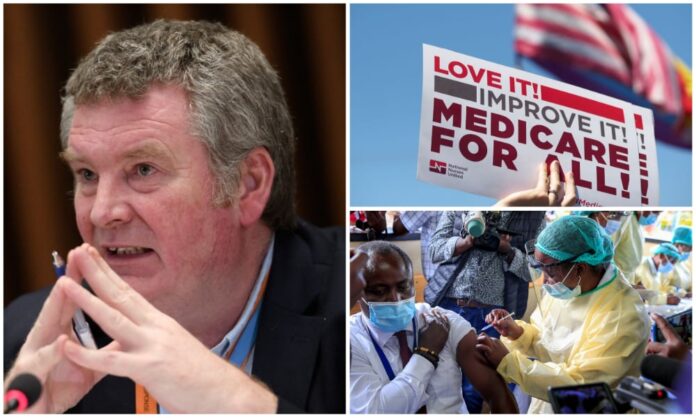DUBAI: Governments need to look at health provision as an investment in their people and not simply as a cost burden, a leading World Health Organization official has said.
“Until that happens, we’re not going to get anywhere,” Dr. Michael Ryan, executive director of the WHO Health Emergencies Programme, said.
Ryan told a session on “Sustaining Health: An Agenda For All” at the World Government Summit on Tuesday that it was important for all countries to invest not just with money, but in ideas and innovation, and where other nations had shortfalls, to help them, too.
“For too long we have seen health provision as a cost and not as an investment and until we do we are not going to get anywhere,” Ryan told a hall filled with delegates, mostly employed in the health sector.
But he also called on world leaders to remember what they learned and experienced from events such as the COVID 19 pandemic.
“In my experience, in a crisis everyone makes promises to change — but the truth is people move on and they forget. I don’t think we have learned yet from the lessons.”
Every country needs a national health emergency plan, he added.
“A lot of countries will need help doing that,” Ryan told delegates, adding: “We are only as prepared as the least prepared country.
“We are all responsible for our own populations, but part of the responsibility is a global deal with different things being worked on in different places.”
He said countries needed to share their specialisms with other nations around the world.
Reflecting on the past four years and the pandemic, he said: “We need a new promise for the future and we need governments to make sure that promise is kept. We need governments to make sure we don’t face a disaster like this again.”
Speaking earlier, the UAE Minister of Health and Prevention, Abdulrahman Al-Owais, told delegates that there was now a new question relating to “how we maintain a sustainable preparedness for threats to health.”
He said there was an important focus on health resilience, ensuring that countries responded effectively while maintaining effective health services.
A number of factors are affecting health in the world, including climate change, which caused 250,000 additional deaths per year — its direct impact on health would cost $2 billion to $4 billion by 2050.
Al-Owais said there is also a need for the general population to be given the confidence to trust their own and world leaders when handling incidents such as a global pandemic.
The minister said he believed that in the UAE the handling of COVID-19 was effective. He said the private sector very quickly developed vaccinations.
“The population of the UAE, which has at least 200 nationalities living here, did not question the government when vaccinations were made available. Instead they went to the centers and had them.”
Production of vaccines showed governments could work closely with the private sector when it comes to the world’s health, he said.
While many countries around the world enforced strict lockdowns and limited movement, Egypt did not — there have been nearly 515,700 known cases of COVID-19 and 24,809 deaths.
Egypt’s Minister of Health and Population, Khaled Abdel Ghaffar, said there needed to be more focus on research and development, globally.
He mirrored his fellow panelists’ calls for global unity.
“No one nation can solve these problems. We need to work together to make sure that no one (country) is left behind,” Ghaffar said.
“There is no playbook from COVID. We need to share what we have learned as different nations, so we can prepare for different risks we face in the future.”
Referring to Ryan’s earlier comments, he added: “I am only afraid that we forget very easily as human beings.”
But the panel agreed that artificial intelligence could be used to better predict future health risks and map out their likely paths.
“We managed to create enough data to be aware of what we needed to be prepared for the pandemic,” Ghaffar said.
Egypt had already been able to use data the government and health professionals held on local communities, which assisted in the decision not to introduce a lockdown.
Ghaffar said it was important to address funding. “We need to think about funding that is sustained for health, not just during crisis”
He said the challenge in Egypt was especially difficult because local populations were so large.
Learning to cope with health issues, such as COVID-19, posed many challenges for Egypt and the wider world, with the lack of a template on how to cope leaving most governments guessing as to what should be done.

